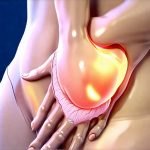Waking up multiple times during the night because of bladder discomfort can be profoundly disruptive, impacting not just your sleep quality but also your overall well-being. It’s an experience many people face, ranging from a mild annoyance to a severely debilitating condition that affects daily life. The causes are varied and complex – sometimes easily addressed, other times requiring more in-depth investigation. Understanding why this happens is the first step toward finding effective strategies for relief and restoring peaceful nights. This article aims to provide a comprehensive overview of potential causes, self-care approaches, and when it’s crucial to seek professional medical advice if bladder pain consistently interrupts your sleep.
The impact of interrupted sleep extends far beyond simply feeling tired. Chronic sleep deprivation weakens the immune system, increases stress levels, impairs cognitive function (affecting concentration and memory), and can contribute to mood disorders like anxiety and depression. A vicious cycle often develops: lack of sleep exacerbates pain, and pain further disrupts sleep. Addressing bladder-related nighttime disturbances isn’t just about comfort; it’s about safeguarding your overall health and quality of life. It’s important to remember that you are not alone in this experience, and there are steps you can take to improve your situation, whether through lifestyle modifications, over-the-counter solutions (always consult a pharmacist), or professional medical guidance. If you suspect your bladder meds are contributing to headaches, consider reading headaches from.
Understanding the Causes of Nocturnal Bladder Pain
The reasons behind waking up with bladder pain at night are diverse. They range from simple behavioral factors and dietary choices to underlying medical conditions. One common cause is simply drinking too much fluid, particularly caffeinated or alcoholic beverages, close to bedtime. These substances have diuretic effects – meaning they increase urine production – leading to a fuller bladder overnight. Another frequent culprit is an overactive bladder (OAB), where the bladder muscles contract involuntarily, creating a sudden and urgent need to urinate. This can occur even when the bladder isn’t full. However, it’s vital not to self-diagnose; these are just possibilities, and a proper medical evaluation is always recommended.
Beyond lifestyle factors and OAB, several underlying medical conditions can contribute to nocturnal bladder pain. Urinary tract infections (UTIs) are a common cause, often presenting with burning sensations during urination, frequent urges, and lower abdominal discomfort. Interstitial cystitis (IC), also known as painful bladder syndrome, is a chronic condition causing bladder pressure, bladder pain, and sometimes pelvic pain. This can be particularly disruptive to sleep due to its unpredictable nature and the intensity of the associated discomfort. Furthermore, conditions like diabetes, prostate enlargement in men, or neurological disorders can all affect bladder control and contribute to nighttime symptoms. It’s also important to consider that certain medications might have side effects that impact bladder function. If you find your UTIs are cyclical, there’s information on UTI returning.
Finally, it’s crucial to distinguish between pain directly from the bladder itself and referred pain – discomfort originating elsewhere but felt in the bladder region. Back problems, pelvic floor dysfunction, or even musculoskeletal issues can sometimes mimic bladder pain, making accurate diagnosis essential for effective treatment. A healthcare professional will be able to differentiate these sources through a thorough examination and appropriate testing. If you experience shifting symptoms, learning UTI symptoms can be helpful.
Lifestyle Modifications for Better Sleep
Making small changes to your daily routine can significantly reduce nighttime bladder discomfort. These modifications focus on managing fluid intake, timing of hydration, and dietary adjustments. – Limit fluids 2-3 hours before bed, especially diuretics like caffeine (coffee, tea, soda), alcohol, and carbonated beverages. – Instead of drinking a large amount of water right before sleep, spread your hydration throughout the day. – Avoid foods that irritate the bladder, such as spicy foods, citrus fruits, tomatoes, chocolate, and artificial sweeteners. Keeping a food diary can help identify specific triggers.
Beyond fluid intake and diet, consider your bowel habits. Constipation can put pressure on the bladder, exacerbating symptoms. Ensuring regular bowel movements through adequate fiber intake and hydration is beneficial. Additionally, pelvic floor exercises (Kegels) can strengthen the muscles supporting the bladder and urethra, improving control and reducing urgency. These exercises are particularly helpful for those with stress incontinence or OAB. Consistency is key; aim to perform these exercises several times a day.
Finally, establish a relaxing bedtime routine to promote better sleep quality overall. This could include taking a warm bath, reading a book (avoiding screens!), listening to calming music, or practicing meditation. A regular sleep schedule – going to bed and waking up around the same time each day – also helps regulate your body’s natural sleep-wake cycle, potentially reducing nighttime awakenings. Prioritizing these lifestyle changes can often provide significant relief.
When to Seek Medical Attention
While many cases of occasional bladder pain during the night can be managed with self-care strategies, it’s crucial to seek professional medical attention if symptoms are persistent, severe, or accompanied by other concerning signs. Don’t hesitate to consult a doctor if you experience any of the following: – Frequent urination (more than 8 times in 24 hours) – Urgent need to urinate that is difficult to control – Painful urination or burning sensation – Blood in your urine – Fever or chills – Lower back pain – Pelvic pain that isn’t related to menstruation
A healthcare professional can perform a thorough evaluation, including a physical exam, urine analysis, and potentially other diagnostic tests like cystoscopy (examining the bladder with a small camera) or urodynamic testing (assessing bladder function). These tests help determine the underlying cause of your symptoms and guide appropriate treatment. Early diagnosis is key to preventing complications and improving long-term outcomes. Don’t delay seeking help if you are concerned about your symptoms; it’s always better to be proactive when it comes to your health. For women experiencing chronic bladder pain, learning more about bladder pain in can empower them.
Managing Pain While Awaiting Medical Evaluation
While awaiting a medical evaluation, there are strategies that can provide temporary relief from bladder pain. Over-the-counter pain relievers like ibuprofen or acetaminophen may help manage discomfort, but always follow the recommended dosage and consult with a pharmacist if you have any underlying health conditions or take other medications. Warm compresses applied to the lower abdomen or back can also soothe muscle tension and reduce pain. Additionally, practicing relaxation techniques such as deep breathing exercises or progressive muscle relaxation can help alleviate stress and anxiety, which can exacerbate pain perception.
It’s important to continue tracking your symptoms – keeping a bladder diary detailing when you urinate, how much fluid you drink, and the level of pain you experience – will provide valuable information for your doctor. This diary can help identify patterns and triggers, aiding in diagnosis and treatment planning. Remember that these are temporary measures; they do not address the underlying cause of your pain, but rather help manage symptoms while you seek professional care. Focus on self-care techniques to improve your comfort levels.
Finally, resist the urge to self-medicate or rely solely on online information for diagnosis and treatment. Always consult with a qualified healthcare professional for personalized advice and guidance based on your specific situation. They can provide accurate assessments, recommend appropriate treatments, and help you develop a comprehensive plan to manage your bladder pain and restore peaceful nights.





















